By Richard Skanse
(LSM March/April 2011/vol. 4 – Issue 2)
Now 13 years (and seven albums) down the proverbial gravel road from her irrefutable breakthrough — and nearly a decade after Time magazine anointed her “America’s Best Songwriter” — Lucinda Williams has been queen of the Americana music hill for so long, it’s hard to believe there was ever a time when she was merely a best-kept secret. But it’s also awfully easy for aficionados of the genre to forget that, outside of the odd Rolling Stone review or appearance on Letterman or Leno, the closest to a real ripple Lucinda’s music has ever made in the mainstream came courtesy of Mary Chapin Carpenter’s hit country cover of “Passionate Kisses”… way back in 1993.

Lucinda Williams, portrait at Paramount Ranch, Agora Hills, California. 15 June 1988. (Photo by Greg Allen)
Carpenter’s recording of “Passionate Kisses” earned Williams a Best Country Song Grammy in ’94, six years after the songwriter debuted the song on her own self-titled third album. Both Lucinda Williams [Rough Trade, 1988] and its follow-up, Sweet Old World [Chameleon, 1992], were warmly received by critics and peers, with Emmylou Harris recording the self-titled album’s “Crescent City” on her 1992 album Cowgirl’s Prayer and the song “Sweet Old World” for her 1995 Grammy winner, Wrecking Ball. Tom Petty and the Heartbreakers were hip to Lucinda Williams’ treasure trove of songs, too, as shown by their gear-burning joyride in “Changed the Locks” for their underrated 1996 soundtrack to She’s the One. Not that any of that exactly made Williams a household name, though; in fact, when the New York Times published “Lucinda Williams is in Pain,” the September 1997 Darcy Frey piece that essentially cemented the Louisiana-born artist’s not-entirely-undeserved reputation as a neurotic perfectionist in the studio, more readers probably wondered “Lu who?” than, “When is she gonna hurry up and finish that new album?”
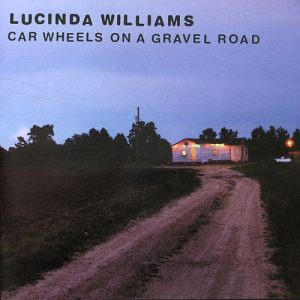 Both questions would be answered some nine months later, with the following summer’s release of Car Wheels on a Gravel Road [Mercury, 1998]. It was Williams’ fifth album in an already nearly two-decade-long recording career, but it landed with the kind of attention-grabbing impact usually associated with the auspicious debuts of fresh young wunderkinds. At 45-years-old, Williams was officially the next big thing at the nexus of folk, roots, country and gritty but literate rock ’n’ roll. Within a year, Car Wheels was certified gold for sales of half a million copies — far from Shania Twain or Dixie Chicks numbers, but hardly chump change for any “contemporary folk” album, even a Grammy-winning one. To the present day, it’s still the most successful album of Williams’ career, both commercially and critically, and inevitably, the yard stick by which all other Lucinda albums before and since are usually measured — if for no better reason than the fact that, like U2’s The Joshua Tree, it’s the point at which so many fans and critics alike probably first came onboard. And yes, that includes plenty of self-acknowledged Williams snobs (like this one) who will argue tirelessly for the superiority of, say, that eponymous album from 1988, or later works, like 2007’s West and even her latest, this year’s Blessed. Leave that fun/contentious debate for later; if you’re new to Lu, Car Wheels on a Gravel Road is still, hands down, the best place to start. But hold on tight: If she doesn’t have you flat on your back and moaning at the ceiling by the end of the first song (or at least flush at the thought), rest assured that this woman’s oeuvre just isn’t gonna be your thang.
Both questions would be answered some nine months later, with the following summer’s release of Car Wheels on a Gravel Road [Mercury, 1998]. It was Williams’ fifth album in an already nearly two-decade-long recording career, but it landed with the kind of attention-grabbing impact usually associated with the auspicious debuts of fresh young wunderkinds. At 45-years-old, Williams was officially the next big thing at the nexus of folk, roots, country and gritty but literate rock ’n’ roll. Within a year, Car Wheels was certified gold for sales of half a million copies — far from Shania Twain or Dixie Chicks numbers, but hardly chump change for any “contemporary folk” album, even a Grammy-winning one. To the present day, it’s still the most successful album of Williams’ career, both commercially and critically, and inevitably, the yard stick by which all other Lucinda albums before and since are usually measured — if for no better reason than the fact that, like U2’s The Joshua Tree, it’s the point at which so many fans and critics alike probably first came onboard. And yes, that includes plenty of self-acknowledged Williams snobs (like this one) who will argue tirelessly for the superiority of, say, that eponymous album from 1988, or later works, like 2007’s West and even her latest, this year’s Blessed. Leave that fun/contentious debate for later; if you’re new to Lu, Car Wheels on a Gravel Road is still, hands down, the best place to start. But hold on tight: If she doesn’t have you flat on your back and moaning at the ceiling by the end of the first song (or at least flush at the thought), rest assured that this woman’s oeuvre just isn’t gonna be your thang.
“Not a day goes by I don’t think about you,” Williams purrs in a hungry Southern drawl at the outset of “Right in Time,” establishing straight away the alarming, primal power of her voice, both as a writer and a singer. It’s the voice of a woman who has lived, loved and lost, hard, and filtered it all through the literary genes inherited from her father, English lit professor and distinguished poet Miller Williams, and the gut-bucket Delta blues she cottoned to during her formative teens and early 20s. Through 12 stunning originals and one just-as-good cover (the jittery Randy Weeks stomper, “Can’t Let Go”), Williams staggers woozily across a torn and frayed — but richly detailed! — landscape of childhood memories, dirty little juke joints and city after Southern city choked thick as kudzu with the ghosts of dead friends, lovers and love affairs. As hinted at in the aforementioned 1997 New York Times story, the making of the album was just as treacherous, with Williams scrapping session after session — entire albums’ worth — in search of the perfect imperfect (that is, raw) sound she heard in her head. It’s hard to argue with the final result (credited to a Frankenstein production team of Williams, Roy Bittan of E Street Band fame and “the twangtrust,” aka Steve Earle and Ray Kennedy), but lost along the way was Williams’ longtime friendship and working relationship with guitarist Gurf Morlix, who produced the earliest (discarded) Car Wheels sessions in Austin in 1995.
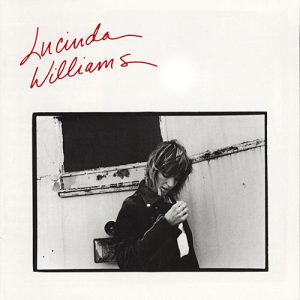 Morlix went on to become one of the foremost producers in the Americana field; today, his somewhat signature sound (as best demonstrated on his own solo projects and Ray Wylie Hubbard’s Growl and Snake Farm albums) is a gnarly, gritty groove channeling chain-gang hollers, muddy-water blues and haunted gospel. That actually doesn’t sound too far off from the Southern-gothic vibe that’s permeated every Williams album since Car Wheels, but it’s worlds away from the markedly crisper, brighter edges of Lucinda Williams and Sweet Old World, both of which Morlix and Williams co-produced (with Dusty Wakeman also credited on Sweet Old World). Not that either of those albums could ever be called “over-produced” — far from it. Although the self-titled album does somewhat show its ’80s vintage, by and large, it’s the absence of excessive atmospheric texturing that makes both albums sound so comparatively clean and brittle next to the bolder Car Wheels and the even more assertive releases that followed in its wake. Though not without flashes of razor-sharp tooth and claw (witness the snarl of “Changed the Locks” on Lucinda Williams and the stinging slash of Sweet Old World’s “Hot Blood” and “Pineola”), the tracks on both albums are left as naked and vulnerable as the emotions laid bare in Williams’ lyrics. Which is exactly how things should be, because the less of anything to get in the way of these particular songs, the better; although Williams’ best albums (plural!) were still ahead of her at this point in her career, nearly every one of her best songs can be found on these two collections.
Morlix went on to become one of the foremost producers in the Americana field; today, his somewhat signature sound (as best demonstrated on his own solo projects and Ray Wylie Hubbard’s Growl and Snake Farm albums) is a gnarly, gritty groove channeling chain-gang hollers, muddy-water blues and haunted gospel. That actually doesn’t sound too far off from the Southern-gothic vibe that’s permeated every Williams album since Car Wheels, but it’s worlds away from the markedly crisper, brighter edges of Lucinda Williams and Sweet Old World, both of which Morlix and Williams co-produced (with Dusty Wakeman also credited on Sweet Old World). Not that either of those albums could ever be called “over-produced” — far from it. Although the self-titled album does somewhat show its ’80s vintage, by and large, it’s the absence of excessive atmospheric texturing that makes both albums sound so comparatively clean and brittle next to the bolder Car Wheels and the even more assertive releases that followed in its wake. Though not without flashes of razor-sharp tooth and claw (witness the snarl of “Changed the Locks” on Lucinda Williams and the stinging slash of Sweet Old World’s “Hot Blood” and “Pineola”), the tracks on both albums are left as naked and vulnerable as the emotions laid bare in Williams’ lyrics. Which is exactly how things should be, because the less of anything to get in the way of these particular songs, the better; although Williams’ best albums (plural!) were still ahead of her at this point in her career, nearly every one of her best songs can be found on these two collections. 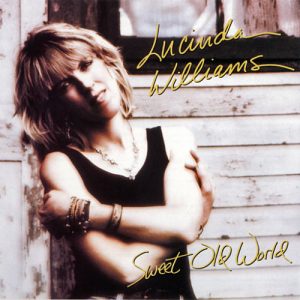 Between the two, Lucinda Williams has the slight edge, with a track list arguably as formidable as Townes Van Zandt’s de facto greatest hits set, Live at the Old Quarter: “Abandoned,” “Big Red Sun Blues,” “Passionate Kisses,” “Crescent City” and (mercy!) “Side of the Road” — just listing their names all in a row like that makes the knees buckle. Sweet Old World is a knockout, too, though, what with its two equally devastating reflections on suicide — the bittersweet, sad sigh of the title track and the raw, angry grief of “Pineola” — offset by the deeply touching portraits of love familial (“Little Angel, Little Brother”), romantic (“Something About What Happens When We Talk”) and unrequited (“Six Blocks Away”).
Between the two, Lucinda Williams has the slight edge, with a track list arguably as formidable as Townes Van Zandt’s de facto greatest hits set, Live at the Old Quarter: “Abandoned,” “Big Red Sun Blues,” “Passionate Kisses,” “Crescent City” and (mercy!) “Side of the Road” — just listing their names all in a row like that makes the knees buckle. Sweet Old World is a knockout, too, though, what with its two equally devastating reflections on suicide — the bittersweet, sad sigh of the title track and the raw, angry grief of “Pineola” — offset by the deeply touching portraits of love familial (“Little Angel, Little Brother”), romantic (“Something About What Happens When We Talk”) and unrequited (“Six Blocks Away”).
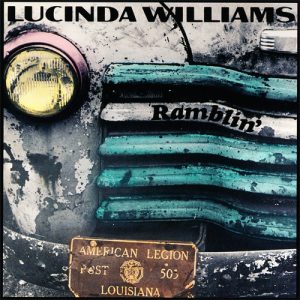 Both albums should be considered absolutely essential, though copies of Lucinda Williams can unfortunately be pricey and hard to come by; inexplicably, despite having been remastered and reissued by the Koch label in 1998, the album is already out of print again, even digitally. One can only assume/hope/pray that it’s bound to be reissued yet again someday. Rest assured, though, that it’s worth the wait — or, in lieu of patience, worth almost any moderately obnoxious price you find it for on the collector’s market. In the meantime, as long you’re looking back in Car Wheels’ rear-view mirror, there are two even earlier Williams albums — both on the Smithsonian Folkways label — still happily in print. Armed with nothing but her not-quite-fully-broken-in voice, her 12-string guitar and one accompanist, guitarist John Grimaudo, Williams cut her 1979 debut, Ramblin’, in a single afternoon at a studio in Jackson, Miss. Although the 25-year-old singer had already been writing and performing her own songs for a number of years on the Austin and Houston folk scenes, she devoted her first album entirely to traditional blues and classic country covers. Robert Johnson’s “Ramblin’ on My Mind” kicks it off, followed by the likes of Memphis Minnie’s “Me and My Chauffeur,” the traditional “Motherless Children” and Hank Williams’ “Jambalaya (On the Bayou).” Purist in heart and performed with spirited pluck, Ramblin’ holds up remarkably well; still, compared to the rest of her catalog, it’s notable mainly as an historic footnote for die-hard completists.
Both albums should be considered absolutely essential, though copies of Lucinda Williams can unfortunately be pricey and hard to come by; inexplicably, despite having been remastered and reissued by the Koch label in 1998, the album is already out of print again, even digitally. One can only assume/hope/pray that it’s bound to be reissued yet again someday. Rest assured, though, that it’s worth the wait — or, in lieu of patience, worth almost any moderately obnoxious price you find it for on the collector’s market. In the meantime, as long you’re looking back in Car Wheels’ rear-view mirror, there are two even earlier Williams albums — both on the Smithsonian Folkways label — still happily in print. Armed with nothing but her not-quite-fully-broken-in voice, her 12-string guitar and one accompanist, guitarist John Grimaudo, Williams cut her 1979 debut, Ramblin’, in a single afternoon at a studio in Jackson, Miss. Although the 25-year-old singer had already been writing and performing her own songs for a number of years on the Austin and Houston folk scenes, she devoted her first album entirely to traditional blues and classic country covers. Robert Johnson’s “Ramblin’ on My Mind” kicks it off, followed by the likes of Memphis Minnie’s “Me and My Chauffeur,” the traditional “Motherless Children” and Hank Williams’ “Jambalaya (On the Bayou).” Purist in heart and performed with spirited pluck, Ramblin’ holds up remarkably well; still, compared to the rest of her catalog, it’s notable mainly as an historic footnote for die-hard completists.
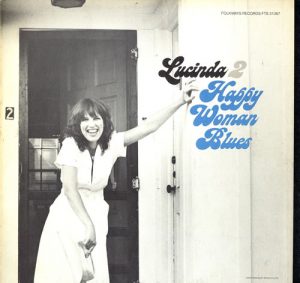 Of considerable more interest is Williams’ second album, 1980’s Happy Woman Blues. All 11 songs here are originals, including a Zydeco-tinged version of “I Lost It” — a song later revisited with far more world-weary conviction on Car Wheels on a Gravel Road. A similarly zesty flair enlivens most of the rest of the album, too, with happy seeming to thump the blues almost every time. The key word there is almost, because Williams packs enough exquisite pain within the four brutal minutes of “King of Hearts” to level a legion of cheerful cupids. “Every time I see you, I want to fall in love again,” she pleads with a soaring desperation, exhaling that first chorus like a dying breath. “I would like to free you, but you won’t even let me in.” The song is an absolute apocalypse of heartache — and one that could only ever be counter-balanced by one other song in her entire catalog. Fortunately, that song’s on Happy Woman Blues, too: “Sharp Cutting Wings (Song for a Poet).” “Let’s fly away to some foreign country, where nobody knows who we are.” Happy vs. blues? Call this round a draw.
Of considerable more interest is Williams’ second album, 1980’s Happy Woman Blues. All 11 songs here are originals, including a Zydeco-tinged version of “I Lost It” — a song later revisited with far more world-weary conviction on Car Wheels on a Gravel Road. A similarly zesty flair enlivens most of the rest of the album, too, with happy seeming to thump the blues almost every time. The key word there is almost, because Williams packs enough exquisite pain within the four brutal minutes of “King of Hearts” to level a legion of cheerful cupids. “Every time I see you, I want to fall in love again,” she pleads with a soaring desperation, exhaling that first chorus like a dying breath. “I would like to free you, but you won’t even let me in.” The song is an absolute apocalypse of heartache — and one that could only ever be counter-balanced by one other song in her entire catalog. Fortunately, that song’s on Happy Woman Blues, too: “Sharp Cutting Wings (Song for a Poet).” “Let’s fly away to some foreign country, where nobody knows who we are.” Happy vs. blues? Call this round a draw.
As rewarding as Williams’ output up to and including Car Wheels on a Gravel Road is, though, it was in the aftermath of that career landmark that she really began to stretch her artistic wings. What’s more, surviving the exhausting, protracted labor pains of making Car Wheels and then seeing it so widely and warmly embraced not only boosted her confidence, but also dramatically limbered up her creative and recording muscles. Having an enthusiastic, artist-friendly major label (Lost Highway) in her corner probably helped a lot, too. Whatever the reasons, the three-year turnaround between Car Wheels and her next album seemed a blur, and she’s maintained a brisk, album-every-two-years release schedule ever since.
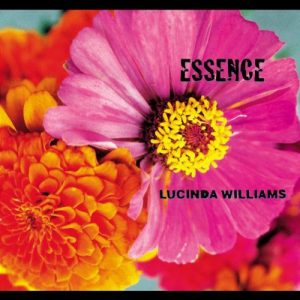 As the immediate follow-up to the most beloved and successful album of Williams’ life, 2001’s Essence was doomed to an inevitable amount of backlash — if not so much from critics, then certainly from the breed of fan given to venting via Amazon reviews and chat rooms whenever an artist changes direction. And Essence, co-produced by Williams and guitarist Charlie Sexton, was definitely a whole ’nother trip. Perhaps the hellfire rave-up “Get Right with God” and the ruminative “Bus to Baton Rouge” might have fit in as part of the previous record’s vivid Southern travelogue, but Essence is overall much more about mood and feeling than place. And that mood, in a word (also one of the song titles), is “Blue.” Blue like the “Lonely Girls” Williams identifies with in the first song — lonely girls who don’t moan at the ceiling thinking about their lovers (a la “Right in Time”) so much as just hide under heavy blankets, singing sweet sad songs like, perhaps, the wistful “I Envy the Wind” and “Reason to Cry.” At the same time, though, this is a Lucinda Williams record called Essence, so there’s still plenty of carnal desire at play here, be it merely hinted at in the determined “Steal Your Love” or, as in the title track, flat-out screamed with all the subtlety of a junkie jonesing for a fix. But even when she sounds like she’s about to come unglued, Williams and Sexton never lose control; they steer Essence from somber reflection to slow-burn sexual napalm and back again with dazzling dexterity and cool.
As the immediate follow-up to the most beloved and successful album of Williams’ life, 2001’s Essence was doomed to an inevitable amount of backlash — if not so much from critics, then certainly from the breed of fan given to venting via Amazon reviews and chat rooms whenever an artist changes direction. And Essence, co-produced by Williams and guitarist Charlie Sexton, was definitely a whole ’nother trip. Perhaps the hellfire rave-up “Get Right with God” and the ruminative “Bus to Baton Rouge” might have fit in as part of the previous record’s vivid Southern travelogue, but Essence is overall much more about mood and feeling than place. And that mood, in a word (also one of the song titles), is “Blue.” Blue like the “Lonely Girls” Williams identifies with in the first song — lonely girls who don’t moan at the ceiling thinking about their lovers (a la “Right in Time”) so much as just hide under heavy blankets, singing sweet sad songs like, perhaps, the wistful “I Envy the Wind” and “Reason to Cry.” At the same time, though, this is a Lucinda Williams record called Essence, so there’s still plenty of carnal desire at play here, be it merely hinted at in the determined “Steal Your Love” or, as in the title track, flat-out screamed with all the subtlety of a junkie jonesing for a fix. But even when she sounds like she’s about to come unglued, Williams and Sexton never lose control; they steer Essence from somber reflection to slow-burn sexual napalm and back again with dazzling dexterity and cool.
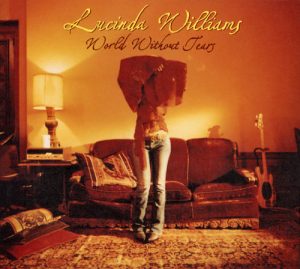 A little more of that control would have gone a long way toward improving 2003’s World Without Tears. Although generally well received by both critics and fans (and more unanimously so than Essence), World remains — at least to this fan/critic’s ears — an easier album to admire than to love. Co-produced by Williams and Mark Howard (a long-time studio partner of Daniel Lanois) and banged out live in the studio with her three-piece road band, there’s a reckless abandon to the record that favors the performances far more than the songs. When it finds its groove, the results are undeniably thrilling and/or beautiful: “Those Three Days,” “Over Time,” “Words Fell,” and the freewheelin’, talkin’-blues (no, not rap) rocker “Sweet Side” all belong on a Lucinda best-of. But often as not here, Williams just goes off the rails; she squaks like a rabid harpy all throug h “Atonement” (souring an otherwise explosive showcase for the band), and the prettiest melody this side of “Sweet Old World” can’t cover up the shocking daftness of the lyrics stinking up “Ventura.” It’s hard to decide which is worse: the pointless line about stirring up her soup “real goooood,” or the nauseous “lean over the toilet bowl and throw up my confession.” And no matter how much radio airplay it got, “Real Live Bleeding Fingers and Broken Guitar Strings” is not a wicked Stones homage; it’s just a shapeless mess flailing about for a hook that never comes.
A little more of that control would have gone a long way toward improving 2003’s World Without Tears. Although generally well received by both critics and fans (and more unanimously so than Essence), World remains — at least to this fan/critic’s ears — an easier album to admire than to love. Co-produced by Williams and Mark Howard (a long-time studio partner of Daniel Lanois) and banged out live in the studio with her three-piece road band, there’s a reckless abandon to the record that favors the performances far more than the songs. When it finds its groove, the results are undeniably thrilling and/or beautiful: “Those Three Days,” “Over Time,” “Words Fell,” and the freewheelin’, talkin’-blues (no, not rap) rocker “Sweet Side” all belong on a Lucinda best-of. But often as not here, Williams just goes off the rails; she squaks like a rabid harpy all throug h “Atonement” (souring an otherwise explosive showcase for the band), and the prettiest melody this side of “Sweet Old World” can’t cover up the shocking daftness of the lyrics stinking up “Ventura.” It’s hard to decide which is worse: the pointless line about stirring up her soup “real goooood,” or the nauseous “lean over the toilet bowl and throw up my confession.” And no matter how much radio airplay it got, “Real Live Bleeding Fingers and Broken Guitar Strings” is not a wicked Stones homage; it’s just a shapeless mess flailing about for a hook that never comes.
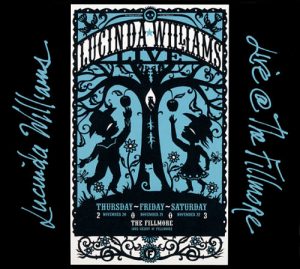 “Real Live Bleeding Fingers” was one of the whopping 11 songs from World Without Tears revisited just two years later on 2005’s Live @ The Fillmore. Fortunately, all of World’s good songs were included, too, with room still left in the 22-song, double-disc set list for a handful of Essence highlights and even “Pineola” and “Changed the Locks” from the way-back machine. After a slow start (three sleepy ballads in a row), the set lifts off with “Out of Touch” and “Sweet Side,” thanks in large part to guitarist Doug Pettibone. In hindsight, though, the best thing about Williams’ first live album was probably just the little bit of extra time its release gave her to really focus on her songwriting craft again.
“Real Live Bleeding Fingers” was one of the whopping 11 songs from World Without Tears revisited just two years later on 2005’s Live @ The Fillmore. Fortunately, all of World’s good songs were included, too, with room still left in the 22-song, double-disc set list for a handful of Essence highlights and even “Pineola” and “Changed the Locks” from the way-back machine. After a slow start (three sleepy ballads in a row), the set lifts off with “Out of Touch” and “Sweet Side,” thanks in large part to guitarist Doug Pettibone. In hindsight, though, the best thing about Williams’ first live album was probably just the little bit of extra time its release gave her to really focus on her songwriting craft again.
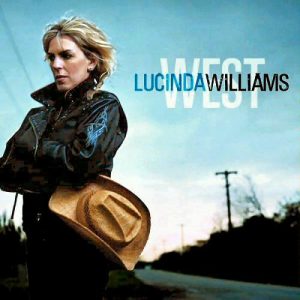 The uniform excellence of the material on her next studio album certainly proves a return to form. Equal parts informed by the passing of her mother and another broken relationship, the songs on West (2007) are among the most trenchantly moving of her career. But it’s not all the grieving going on that gives the album its dignity; it’s the cathartic release, the determination to push through the dark and back into the light. “Unsuffer Me,” Williams begs the universe in one song, sounding at the end of her rope; two songs later, on “Come On,” she’s done with asking politely and begins kicking free on her own terms. It’s far from easy going, but the pay-off — the gorgeous album-closing double-header of “Words” and “West” — is tremendous.
The uniform excellence of the material on her next studio album certainly proves a return to form. Equal parts informed by the passing of her mother and another broken relationship, the songs on West (2007) are among the most trenchantly moving of her career. But it’s not all the grieving going on that gives the album its dignity; it’s the cathartic release, the determination to push through the dark and back into the light. “Unsuffer Me,” Williams begs the universe in one song, sounding at the end of her rope; two songs later, on “Come On,” she’s done with asking politely and begins kicking free on her own terms. It’s far from easy going, but the pay-off — the gorgeous album-closing double-header of “Words” and “West” — is tremendous.
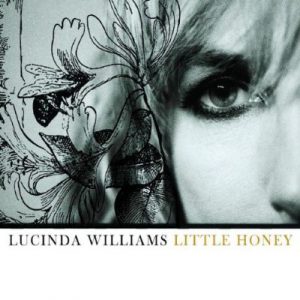 After writing herself back onto her feet — and reportedly finding true love in new boyfriend/manager/producer (and eventually, husband) Tom Overby — Williams knocked out her next album, 2008’s Little Honey, in record time. And though not without a few sublime moments (“Circles and X’s,” “If Wishes Were Horses,” “Plan to Marry”), it’s just as quickly forgotten. Like World Without Tears, Little Honey (rather exhaustively pitched at the time of its release, at least by journalists, as Williams’ “happy album”), is hobbled by sloppy songs (“Real Love” is a real mess, and “Jailhouse Tears” blows its promising start after Williams and her duet partner, Elvis Costello, begin singing at their affected worst). But whereas World, to its credit, at least suggested a flying-without-a-net element of risk and a sustained sense of purpose, Little Honey ultimately just sounds like a bunch of lesser songs thrown together to make a record.
After writing herself back onto her feet — and reportedly finding true love in new boyfriend/manager/producer (and eventually, husband) Tom Overby — Williams knocked out her next album, 2008’s Little Honey, in record time. And though not without a few sublime moments (“Circles and X’s,” “If Wishes Were Horses,” “Plan to Marry”), it’s just as quickly forgotten. Like World Without Tears, Little Honey (rather exhaustively pitched at the time of its release, at least by journalists, as Williams’ “happy album”), is hobbled by sloppy songs (“Real Love” is a real mess, and “Jailhouse Tears” blows its promising start after Williams and her duet partner, Elvis Costello, begin singing at their affected worst). But whereas World, to its credit, at least suggested a flying-without-a-net element of risk and a sustained sense of purpose, Little Honey ultimately just sounds like a bunch of lesser songs thrown together to make a record.
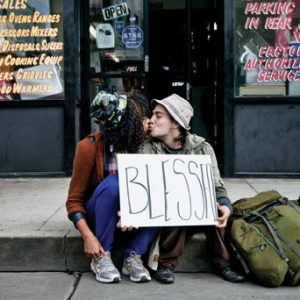 Blessed (2011), on the other hand … now there is a Lucinda album to write home about. From top to bottom, every beautiful moment of this masterpiece (co-produced by Don Was) rings true: not rushed, not over labored — just right. Like West, Car Wheels and Sweet Old World, it’s an album in mourning (“Copenhagen” is as moving an eulogy for a friend as she’s ever written, and “Seeing Black” — lit up with lacerating shards of lead guitar courtesy of Elvis Costello (all is forgiven!) — is another suicide post-mortem in the gripping vein of “Pineola”). But it’s also far, far and away Williams’ most unabashedly optimistic and redemptive record. The title track is a deeply felt shout-out to life’s unsung everyday angels; she lists them one after another, just as an earlier song on the record takes roll call of life’s myriad demons for final judgment. “You were not born to be abandoned,” she intones sternly over a slow-boiling blues; nor, she continues, were you born to be forsaken, mistreated, misguided, enslaved, disgraced, or abused. “You were born to be loved.” And amen to that.
Blessed (2011), on the other hand … now there is a Lucinda album to write home about. From top to bottom, every beautiful moment of this masterpiece (co-produced by Don Was) rings true: not rushed, not over labored — just right. Like West, Car Wheels and Sweet Old World, it’s an album in mourning (“Copenhagen” is as moving an eulogy for a friend as she’s ever written, and “Seeing Black” — lit up with lacerating shards of lead guitar courtesy of Elvis Costello (all is forgiven!) — is another suicide post-mortem in the gripping vein of “Pineola”). But it’s also far, far and away Williams’ most unabashedly optimistic and redemptive record. The title track is a deeply felt shout-out to life’s unsung everyday angels; she lists them one after another, just as an earlier song on the record takes roll call of life’s myriad demons for final judgment. “You were not born to be abandoned,” she intones sternly over a slow-boiling blues; nor, she continues, were you born to be forsaken, mistreated, misguided, enslaved, disgraced, or abused. “You were born to be loved.” And amen to that.
MR. RECORD MAN’S TOP 5 LUCINDA WILLIAMS ALBUMS
1. Lucinda Williams, Rough Trade, 1988
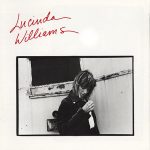 Really, 1992’s Sweet Old World is just as good — and more readily available, as Lucinda Williams is currently out of print. But damn near every song on Williams’ self-titled third album is essential. “Passionate Kisses” and “Changed the Locks” are the best-known “hits” (by merit of being covered by Mary Chapin Carpenter and Tom Petty, respectively), but “Abandoned” and “Side of the Road” are equally notable standouts on an album with no filler.
Really, 1992’s Sweet Old World is just as good — and more readily available, as Lucinda Williams is currently out of print. But damn near every song on Williams’ self-titled third album is essential. “Passionate Kisses” and “Changed the Locks” are the best-known “hits” (by merit of being covered by Mary Chapin Carpenter and Tom Petty, respectively), but “Abandoned” and “Side of the Road” are equally notable standouts on an album with no filler.
2. Car Wheels on a Gravel Road, Mercury, 1998
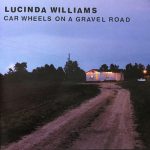 Because every “America’s Best Songwriter” needs their own Blonde on Blonde. The only legitimate knock on this album is that it’s (ahem) “2 Kool 2 Be 4-Gotten” by some Lucinda fans, who are still waiting for her to make Car Wheels 2 — which would be a drag. Other than that, though, this beauty’s features list — “Right in Time,” “Car Wheels on a Gravel Road,” “Drunken Angel,” “Metal Firecracker,” etc. — is to die for. Go for the 2006 “Deluxe Edition,” which adds a bonus disc with a 1998 festival performance taped for WXPN’s Live at the World Cafe.
Because every “America’s Best Songwriter” needs their own Blonde on Blonde. The only legitimate knock on this album is that it’s (ahem) “2 Kool 2 Be 4-Gotten” by some Lucinda fans, who are still waiting for her to make Car Wheels 2 — which would be a drag. Other than that, though, this beauty’s features list — “Right in Time,” “Car Wheels on a Gravel Road,” “Drunken Angel,” “Metal Firecracker,” etc. — is to die for. Go for the 2006 “Deluxe Edition,” which adds a bonus disc with a 1998 festival performance taped for WXPN’s Live at the World Cafe.
3. Essence, Lost Highway, 2001
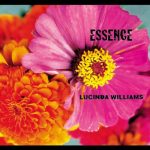 One could argue that every Lucinda album is, to some degree or other, all about lonely girls, broken butterflies, unshakable blues and sexual desire strong enough to tear your soul apart. But no other Lucinda album does it all in more magnificently melancholy fashion than this one. Highlights: “Steal Your Love,” “Blue,” “Out of Touch,” “Are You Down,” “Essence,” “Broken Butterflies.”
One could argue that every Lucinda album is, to some degree or other, all about lonely girls, broken butterflies, unshakable blues and sexual desire strong enough to tear your soul apart. But no other Lucinda album does it all in more magnificently melancholy fashion than this one. Highlights: “Steal Your Love,” “Blue,” “Out of Touch,” “Are You Down,” “Essence,” “Broken Butterflies.”
4. West, Lost Highway, 2007
 Are you alright? Has the death of a loved one, or the the end of a dear friendship, turned your life upside down and cast your days into darkness? Then go West, because this record — arguably as much as any therapist — can help you learn how to live again. Trust me. Proof: “Are You Alright?,” “Unsuffer Me,” “Come On,” “Words,” “West.”
Are you alright? Has the death of a loved one, or the the end of a dear friendship, turned your life upside down and cast your days into darkness? Then go West, because this record — arguably as much as any therapist — can help you learn how to live again. Trust me. Proof: “Are You Alright?,” “Unsuffer Me,” “Come On,” “Words,” “West.”
5. Blessed, Lost Highway, 2011
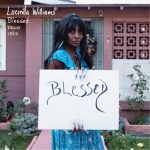 How old does an album have to be before it can safely be deemed a “classic” or even the crowning achievement of an artist’s career? Is it always a matter of years, or can we talk weeks? Either way, start the countdown, because the immensely rewarding Blessed was born to be loved. Count these blessings amonst Lucinda’s absolute best: “Buttercup,” “Copenhagen,” “Seeing Black,” “Blessed,” “Awakening,” “Kiss Like Your Kiss.”
How old does an album have to be before it can safely be deemed a “classic” or even the crowning achievement of an artist’s career? Is it always a matter of years, or can we talk weeks? Either way, start the countdown, because the immensely rewarding Blessed was born to be loved. Count these blessings amonst Lucinda’s absolute best: “Buttercup,” “Copenhagen,” “Seeing Black,” “Blessed,” “Awakening,” “Kiss Like Your Kiss.”




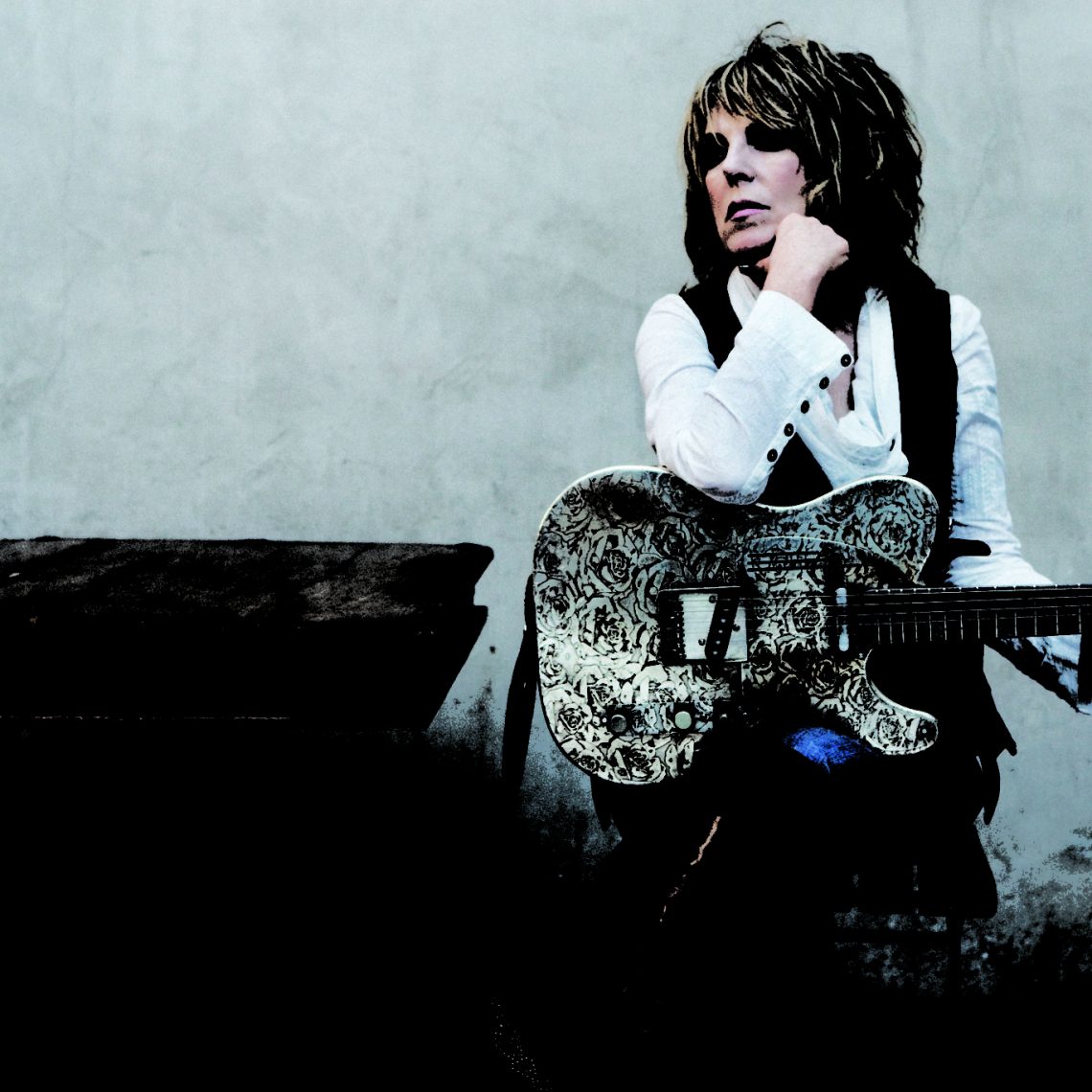

No Comment